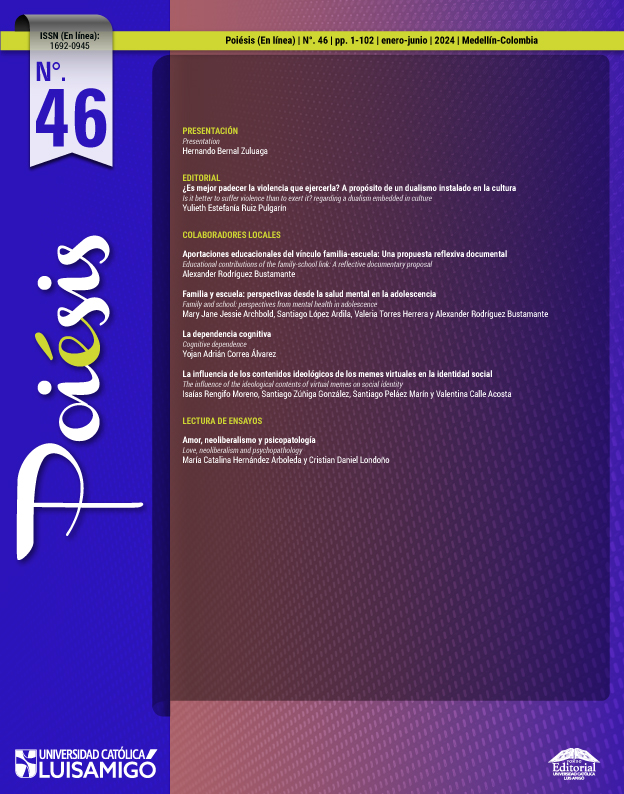Love, neoliberalism and psychopathology
DOI:
https://doi.org/10.21501/16920945.4750Keywords:
amor, neoliberalismo, psicopatología, capitalismo, psicoanalisis, Imagen ideal, Narcisismo, PulsiónAbstract
Neoliberalism has brought with it the transformation in the ways in which being is conceived and all the spheres in which it operates, likewise, the link with others and its different repercussions. Since Freud, it is possible to conceive love as a projection of an ideal image, the image that one feels not possessing but believes to find it in others, that is, we complement each other through the other (Dessal, 2019), this can be explained through primary narcissism, in which the ego takes itself as an object, but later, it takes the other as the destiny of the drive, here it may or may not make it an object of love (Freud, 1984), as can be inferred , narcissism gives way to love, however, this transfer is achieved if the image represents the ideal itself.
Downloads
References
Badiou, A. y Truong, N. (2009). El elogio del amor. Flammarion. https://profesorvargasguillen.wordpress.com/wp-content/uploads/2014/01/badiou-elogio-del-amor.pdf
Dessal, G. (19 de 05 de 2020). Qué es el amor. De Inconscientes. https://deinconscientes.com/que-es-el-amor-gustavo-dessal/
Dörr-Zegers, O. (2005). Fenomenología del amor y psicopatología. Salud Mental, 28(1), 1-15. https://www.redalyc.org/pdf/582/58212801.pdf
Freud, S. (1984/1914). Introducción del narcisismo. En J. Strachey (Ed.) y J. L. Etcheverry (Trad.). Obras Completas (Vol. XIV, pp. 65-98). Amorrortu.
Gerez Ambertín, M. G. (2011). Ley, culpa y clandestinidades en el amor (psicopatología de la vida amorosa cotidiana). Tempo Psicoanalítico, 43(1), 59-70. http://pepsic.bvsalud.org/scielo.php?script=sci_arttext&pid=S0101-48382011000100004
Lacan, J. (1955-1956). El seminario de Jacques Lacan, libro 3: La psicosis. Paidós. https://www.dropbox.com/s/tiavi0m2rev2u3s/Seminario%203%20-%20Las%20psicosis.pdf?dl=0
Lacan, J. (1960-1961). El seminario de Jacques Lacan, libro 8: La transferencia. Paidós. https://www.dropbox.com/s/wv1khf5qlkn028z/Seminario%208%20-%20La%20transferencia.pdf?dl=0
Lacan, J. (2012/1972). Hablo a las paredes. Paidós. https://es.scribd.com/document/358631942/Hablo-a-Las-Paredes-Jacques-Lacan
Pedroza Flores, R. (2015). Los cambios del vínculo amoroso en la posmodernidad. Revista Iberoamericana de las Ciencias Sociales y Humanísticas, 4(8), 1-13. https://www.ricsh.org.mx/index.php/RICSH/article/view/54
Platón. (2007/1871). El banquete. En Platón, Obras completas (t. 5, pp. 286-366). Edición de Patricio de Azcárate.
Salobral Martín, N. (2014). Amor: ¿Verdad o consumo? Investigaciones Femeninas (5), 371-389. https://www.researchgate.net/publication/276345421_Amor_Verdad_o_Consumo
Soler, C. (2008). Lo que Lacan dijo de las mujeres. Paidós. https://www.studocu.com/es-mx/document/colegio-de-ciencias-y-humanidades-plantel-2-unam/psicologia-social/colette-soler-lo-que-lacan-dijo-de-las-mujeres-compress/83863301
Valsega Piazza, E. (2015-2016). El rechazo del amor en el capitalismo: convergencias teóricas actuales. Forum, XXIII, 49-63. https://www.researchgate.net/publication/337741394_El_rechazo_del_amor_en_el_capitalismo_convergencias_teoricas_actuales
Vargas Castro, D. A. (2013). Una paradoja freudiana del amor . Desde el Jardín de Freud. Revista de Psicoanálisis, 13, 93-103. https://repositorio.unal.edu.co/handle/unal/73728
Published
How to Cite
Issue
Section
License

This work is licensed under a Creative Commons Attribution-NonCommercial-NoDerivatives 4.0 International License.
La revista y los textos individuales que en esta se divulgan están protegidos por las leyes de copyright y por los términos y condiciones de la Licencia Creative Commons Atribución-No Comercial- 4.0 Internacional. Permisos que vayan más allá de lo cubierto por esta licencia pueden encontrarse en http://www.funlam.edu.co/modules/fondoeditorial/ Derechos de autor.











